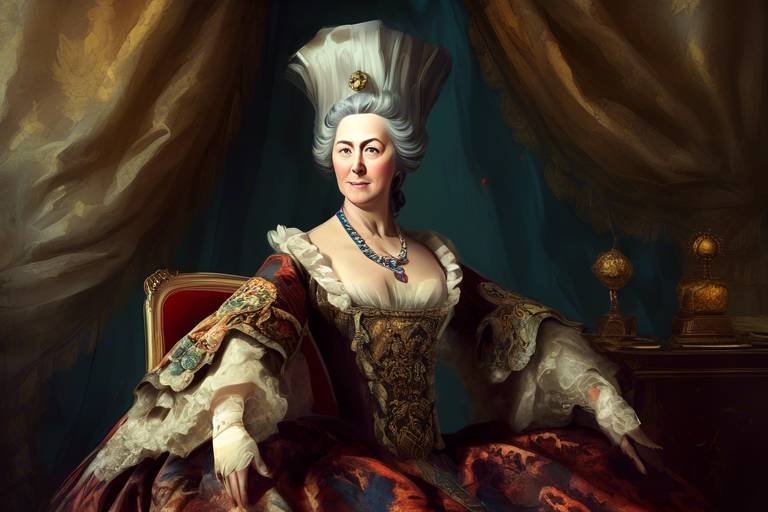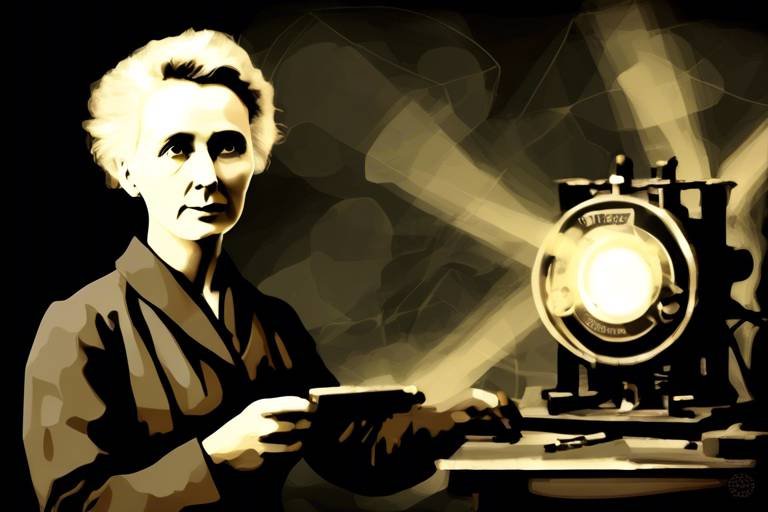Lovelace: The First Computer Programmer
Ada Lovelace, often hailed as the first computer programmer, was a visionary figure whose groundbreaking work continues to influence the world of computing. Her collaboration with Charles Babbage, the inventor of the Analytical Engine, marked a significant milestone in the history of technology. Born in 1815, Lovelace displayed a remarkable aptitude for mathematics from a young age, paving the way for her remarkable contributions to the field.
Despite the societal norms of her time, Lovelace pursued an education in mathematics and science, areas traditionally dominated by men. Her keen intellect and insatiable curiosity led her to delve into complex mathematical concepts, setting the stage for her partnership with Babbage. Together, they embarked on a journey that would revolutionize the way we perceive computation.
One of Lovelace's most notable achievements was the writing of the first algorithm for the Analytical Engine. This feat not only demonstrated her exceptional analytical skills but also showcased her foresight in envisioning the potential of programming. In a world where the concept of computer programming was virtually nonexistent, Lovelace's work laid the foundation for future innovations in the field.
Furthermore, Lovelace's mathematical prowess was unparalleled, as she applied mathematical principles to solve complex problems in the realm of computing. Her innovative approach to combining mathematics and technology set her apart as a trailblazer in a male-dominated industry, earning her recognition as a pioneer in the field of computer science.
Ada Lovelace's legacy transcends generations, inspiring women around the world to pursue careers in technology and challenging the status quo in a male-centric field. Her impact on gender diversity in technology continues to resonate today, as more women are encouraged to follow in her footsteps and make their mark in the world of computing.
As we celebrate Ada Lovelace Day, we honor her enduring legacy and the contributions she made to the field of science, technology, engineering, and mathematics. Her indelible mark on modern computing serves as a testament to the power of innovation and perseverance, reminding us that anyone, regardless of gender, can shape the future of technology.

Early Life and Education
Ada Lovelace, often hailed as the first computer programmer, left an indelible mark on the world of computing with her pioneering work alongside Charles Babbage. Let's delve into the life and contributions of this remarkable woman and explore the impact she had on the field of technology.
Ada Lovelace was born in 1815 to the famous poet Lord Byron and Anne Isabella Milbanke. Her upbringing was marked by a strong emphasis on education and intellectual pursuits. Despite her mother's efforts to steer her away from the perceived madness of poetry, Ada's passion for mathematics and science blossomed at a young age.
Her education was unconventional for a woman of her time, with Ada studying mathematics and logic, subjects typically reserved for men. This early exposure to intellectual pursuits laid the foundation for her future contributions to the world of computing.
Ada Lovelace's interest in mathematics led her to form connections with prominent mathematicians and scientists of the era, shaping her into a formidable intellect with a keen analytical mind.
Ada's most significant partnership was with Charles Babbage, the inventor of the Difference Engine and the Analytical Engine. Babbage recognized Ada's mathematical prowess and invited her to work on the Analytical Engine, a revolutionary machine designed to perform complex calculations.
Together, Ada Lovelace and Charles Babbage embarked on a journey to explore the potential of the Analytical Engine, with Ada providing crucial insights and developing groundbreaking concepts that would shape the future of computing.
One of Ada Lovelace's most notable achievements was the writing of the first algorithm for the Analytical Engine. Her algorithm, designed to calculate Bernoulli numbers, showcased her visionary approach to computer programming and laid the groundwork for future advancements in the field.
Ada Lovelace's mathematical contributions extended beyond her work on the Analytical Engine. She envisioned a future where mathematics could be used to create complex algorithms and programs, a concept that was ahead of its time and instrumental in shaping the field of computing.
Despite facing skepticism and criticism during her lifetime, Ada Lovelace's legacy endured, solidifying her reputation as a trailblazer in the world of technology. Her contributions to computer science were recognized posthumously, cementing her status as the first computer programmer.
Ada Lovelace's work laid the foundation for modern computing, influencing generations of programmers and technologists. Her visionary insights into computer programming continue to shape contemporary technology, highlighting the enduring impact of her contributions.
Ada Lovelace's role as a pioneer in programming inspired countless women to pursue careers in technology. Her dedication to breaking gender barriers in the field serves as a beacon of empowerment for aspiring female technologists, emphasizing the importance of diversity and inclusion in the tech industry.
Ada Lovelace Day stands as a tribute to the achievements of women in science, technology, engineering, and mathematics (STEM). This annual event celebrates Ada's legacy and honors the women who continue to make significant contributions to the world of technology, fostering a culture of innovation and diversity.

Collaboration with Charles Babbage
Ada Lovelace, known as the first computer programmer, made significant contributions to the field of computing. Let's delve into her life and explore the pioneering work she did alongside Charles Babbage.
Ada Lovelace's collaboration with Charles Babbage was a groundbreaking partnership that shaped the future of computing. Together, they worked on the Analytical Engine, a revolutionary invention ahead of its time. Babbage, known as the "father of the computer," designed the machine, while Lovelace provided the visionary insights into programming it.
The synergy between Lovelace's mathematical prowess and Babbage's engineering skills was exceptional. Their collaboration resulted in the creation of the first algorithm for the Analytical Engine, a pivotal moment in the history of computer programming.
Lovelace's ability to see beyond the capabilities of the Analytical Engine and envision its potential applications laid the foundation for modern computing. Her work with Babbage marked the beginning of a new era, where machines could be programmed to perform various tasks with precision and accuracy.
Through their collaboration, Lovelace and Babbage demonstrated the power of combining mathematical concepts with engineering principles to create innovative solutions. Their partnership exemplified the essence of teamwork and shared vision in driving technological advancements.
1. Who was Ada Lovelace and why is she considered the first computer programmer?
Ada Lovelace, the daughter of the famous poet Lord Byron, is recognized as the first computer programmer for her work on the Analytical Engine, where she wrote the first algorithm designed to be processed by a machine.
2. What was the Analytical Engine, and why was it significant in the history of computing?
The Analytical Engine was a mechanical general-purpose computer designed by Charles Babbage. It was significant as it laid the foundation for modern computers by introducing key concepts such as programming, memory, and data processing.
3. How did Ada Lovelace's collaboration with Charles Babbage influence modern computing?
Ada Lovelace's collaboration with Charles Babbage laid the groundwork for modern computing by showcasing the potential of programming machines to perform complex tasks. Her visionary insights into algorithms and mathematical applications set the stage for the development of computer programming as we know it today.

Writing the First Algorithm
Ada Lovelace's groundbreaking work in writing the first algorithm for the Analytical Engine marked a pivotal moment in the history of computing. Her collaboration with Charles Babbage led to the development of a set of instructions that could be processed by a machine, laying the foundation for modern programming.
Lovelace's algorithm, designed to calculate Bernoulli numbers, demonstrated her visionary insights into the potential of computers. By breaking down complex mathematical tasks into a series of logical steps, she showcased the power of programming in automating processes and solving intricate problems.
Through her work, Lovelace not only created a blueprint for future programmers but also highlighted the creative and analytical aspects of coding. She saw beyond the mere calculation capabilities of machines, envisioning a world where computers could be used for a wide range of tasks beyond number crunching.

Mathematical Contributions
Ada Lovelace's mathematical contributions were truly groundbreaking, setting her apart as a visionary in the world of computing. She not only grasped the complexities of mathematics but also had the foresight to apply them in ways that would shape the future of technology. Lovelace's innovative approach to mathematics paved the way for her to delve into the realm of computing, where she left an indelible mark.
One of Lovelace's key mathematical contributions was her ability to see beyond the numbers and equations, envisioning how they could be utilized in the creation of algorithms. She understood the power of mathematical logic in programming, a concept that was far ahead of her time. By marrying mathematics with the emerging field of computing, Lovelace demonstrated a level of insight that was truly revolutionary.
Furthermore, Lovelace's mathematical prowess enabled her to grasp the intricate workings of the Analytical Engine, a mechanical computer designed by Charles Babbage. Her deep understanding of mathematics allowed her to write the first algorithm for this groundbreaking machine, a feat that solidified her legacy as the world's first computer programmer.
In essence, Ada Lovelace's mathematical contributions were not just about numbers; they were about unlocking the potential of mathematics in the realm of computing. Her ability to see patterns, logic, and algorithms where others saw only figures and symbols set her apart as a true pioneer in the field. Lovelace's mathematical legacy continues to inspire and influence generations of programmers and technologists.

Legacy and Recognition
Ada Lovelace's legacy in the field of computer science is nothing short of revolutionary. Her pioneering work with Charles Babbage on the Analytical Engine solidified her position as the first computer programmer in history. Despite living in the 19th century, Lovelace's visionary insights into mathematics and computing laid the groundwork for the digital age we now inhabit.
Recognized for her exceptional intellect and innovative thinking, Ada Lovelace's contributions to the world of technology continue to be celebrated today. Her analytical approach to problem-solving and her ability to think outside the box set her apart as a trailblazer in a male-dominated industry.
Moreover, Lovelace's recognition as a pioneer in programming serves as an inspiration to aspiring technologists, especially women. By breaking barriers and challenging societal norms, she paved the way for future generations of female programmers and engineers to pursue their passions without constraints.
Ada Lovelace's legacy extends far beyond her time, influencing the very fabric of modern computing. Her remarkable achievements continue to shape the way we approach technology, emphasizing the importance of creativity, logic, and innovation in the ever-evolving world of computer science.

Impact on Modern Computing
Ada Lovelace's impact on modern computing is nothing short of revolutionary. Her pioneering work with Charles Babbage laid the groundwork for the technology-driven world we live in today. By envisioning the capabilities of the Analytical Engine and writing the first algorithm for it, Lovelace demonstrated a level of foresight that was truly ahead of her time. Her innovative approach to mathematics and its application in computing set a precedent for future generations of programmers and engineers.
One of the key aspects of Lovelace's impact on modern computing is her emphasis on the creative and analytical aspects of programming. She believed that computers could be used not just for calculations, but also for artistic endeavors, a concept that was revolutionary in the 19th century. This holistic view of computing laid the foundation for the diverse applications of technology that we see today, from art and music to scientific research and data analysis.
Furthermore, Lovelace's legacy extends beyond her technical contributions. As a woman in a male-dominated field, she defied societal norms and paved the way for future generations of women in technology. Her story serves as an inspiration for women around the world, encouraging them to pursue careers in STEM fields and break barriers in the tech industry.
Ada Lovelace's impact on modern computing continues to be celebrated and recognized today. Her visionary insights and innovative spirit have left an indelible mark on the world of technology, reminding us of the power of imagination and perseverance in shaping the future.

Women in Technology
Women have played a crucial role in shaping the landscape of technology, yet their contributions have often been overlooked or undervalued. Ada Lovelace stands as a shining example of a woman who defied societal norms and made significant strides in the field of computing. Her pioneering work with Charles Babbage on the Analytical Engine laid the foundation for modern programming, showcasing her exceptional talent and vision.
Despite facing numerous challenges and barriers due to her gender, Ada Lovelace's determination and intellect propelled her to become the world's first computer programmer. Her legacy continues to inspire women around the globe to pursue careers in technology, breaking stereotypes and pushing boundaries in a male-dominated industry.
Ada Lovelace's remarkable achievements serve as a beacon of hope for aspiring female technologists, demonstrating that gender should never be a barrier to success. By celebrating Ada Lovelace Day and honoring her contributions, we not only recognize her groundbreaking work but also encourage future generations of women to follow in her footsteps and make their mark in the world of technology.

Celebrating Ada Lovelace Day
Ada Lovelace Day is an annual celebration dedicated to honoring the achievements of women in science, technology, engineering, and mathematics (STEM). It serves as a tribute to Ada Lovelace's remarkable contributions to the field of computing and aims to inspire and empower women to pursue careers in these male-dominated fields. The day is marked by various events, workshops, and initiatives that highlight the accomplishments of women in STEM and promote gender diversity and equality in the tech industry.
Frequently Asked Questions
- Who was Ada Lovelace?
Ada Lovelace, born Augusta Ada Byron, was a mathematician and writer known for her work on Charles Babbage's early mechanical general-purpose computer, the Analytical Engine. She is often regarded as the first computer programmer.
- What is Ada Lovelace best known for?
Ada Lovelace is best known for writing the first algorithm intended to be processed by a machine. Her notes on the Analytical Engine include what is now considered to be the first algorithm ever specifically tailored for implementation on a computer, making her a pioneer in the field of computer programming.
- How did Ada Lovelace contribute to modern computing?
Ada Lovelace's contributions to modern computing lie in her visionary insights into the potential of computers beyond mere calculation. By recognizing that machines could manipulate symbols as well as numbers, she laid the groundwork for the development of modern programming and software development.
- Why is Ada Lovelace Day celebrated?
Ada Lovelace Day is celebrated to honor the achievements of women in science, technology, engineering, and mathematics (STEM) fields. It serves as a reminder of Ada Lovelace's pioneering work and aims to inspire more women to pursue careers in technology and innovation.



















